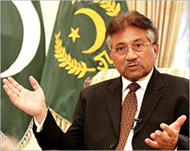Pakistan ‘aided’ Kashmiri separatists
Pakistan’s main spy agency gave military training to Kashmiri rebels battling security forces in Indian-administered Kashmir, a separatist leader has revealed for the first time.

While India has long accused Pakistan of training and arming the rebels, a charge Islamabad denies, this is the first confirmation by a separatist leader in the troubled Himalayan region. It comes at a time of unprecedented peace steps by the two nuclear-armed powers.
The Kashmir dispute has been at the heart of decades of hostility between India and Pakistan, and tens of thousands of people have been killed in the rebellion against Indian rule in its part of the Muslim-majority region.
Pakistan’s ISI
The revelation of help for the rebels from Pakistan’s Inter-Service Intelligence (ISI) agency comes in a new book by Amanullah Khan, chief of Jammu Kashmir Liberation Front (JKLF).
“We had a gentleman’s agreement, an oral sort of agreement. I was given the idea that the ISI was all for the independence of Kashmir,” Khan said on Friday, referring to the beginning of ISI help for his group.
|
“We had a gentleman’s agreement, an oral sort of agreement” Amanullah Khan, |
He said he was given the impression that Pakistan’s then military ruler, General Zia-ul-Haq, also supported the notion of independence for Kashmir.
Khan said the JKLF began bringing young men into Pakistani-administered Kashmir from the Indian side in 1988, where they received training from the ISI.
Training and ideology
“The agreement was that we will bring boys from across and indoctrinate our ideology by ourselves. ISI trains them and they are sent back,” he said.
Pakistan has always denied training or arming the separatists, but it has said it offers political support to what it calls the freedom struggle of the Kashmiri people.
The neighbours have fought two of their three wars since their independence in 1947 over Kashmir.
The JKLF, which wants independence from both India and Pakistan, is one of about a dozen rebel groups opposed to Indian rule.
Factional rivalry
It split in the mid-90s, with one faction giving up armed opposition. Khan’s faction suspended its military action several years ago.
 |
|
Pakistan has always denied |
The JKLF retains strong support among Kashmiris, but since the early 1990s the lead role in the insurgency has been taken over by Islamic groups that want Kashmir to become part of Muslim Pakistan.
Khan’s Urdu-language book Jehed-e-Musalsal, or Continuous Struggle, is the second volume of his autobiography. He said he expected to publish one more volume.
Khan said ISI training for his group ended in late 1989 or early 1990 after the intelligence agency tried to interfere in his group’s affairs.
Relations
At the time, the ISI was nurturing other groups with a different ideology, he said, referring to the gradual rise to prominence of more Islamic Kashmiri groups, compared with his more secular, nationalist group.
Since then, relations between the two neighbours have improved, and last year they launched peace talks.
The two countries have started a bus service between the two sides of the divided region, and this month India allowed a group of nine prominent separatist politicians to travel to Pakistan for talks with fellow Kashmiris and Pakistani leaders.
India holds 45% of Kashmir and considers it an integral part of the country. Pakistan controls a third of its area and China holds the remainder.
Many Muslim Kashmiris resented New Delhi’s rule for years before the insurgency erupted in the late 1980s.